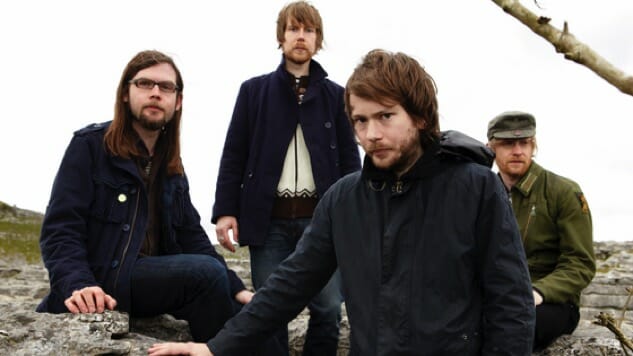Man Vs. Nature: Wolf People Imagine A World in Ruins on Their Third Album

In an ideal world, nature and humanity would level much greater respect for the symbiotic rules of engagement that are crucial to the other’s successful existence. The dichotomy, of course, lies in the narrow space between nature vs. humankind?how humankind cannot exist without the calculated chaos of a natural world unaware of the insistency of its own wrath. Sooner or later there is a breaking point, and it is one or the other that stages a temporary victory. Jack Sharp, the eloquent vocalist/guitarist of English progressive psych-rock tricksters Wolf People, was no longer interested in splitting the difference on the band’s third album, Ruins.
“I found it quite comforting to imagine what the world would be like suddenly without humans on it,” explains Sharp via phone from his home in Bedfordshire. “I just started to daydream about what that would actually look like and how it would feel.”
Sharp?who along with drummer Tom Watt, guitarist Joe Hollick and bassist Dan Davies form the core of Wolf People?grew up in the English countryside, but was born in London’s Southeast quadrant, an area ravaged by German bombing strikes during the Second World War. When Sharp was a boy, many of the neighborhood’s blocks were still without buildings since being destroyed, giving way to temporary ghetto jungles right in the heart of the city.
“You’d see smashed glass in them, but you’d also see loads and loads of animals and plants and young trees growing in these places,” Sharp says. “It was amazing to me how if you just leave something, how quickly it gets overtaken.”
So goes the thematic arc of Ruins’ overtures, though Sharp insists this is no concept record. Whereas the band’s hotly buzzed-about 2013 LP Fain delivered a masterful interdependence of folk-like storytelling and toothsome proto-metal, on Ruins, Sharp’s decidedly darker duties tackle the repossession of modernity’s flashy traps by the very earth they were sprung from. Add in an affinity for creepy English folktales, woodwinds, Sabbathesque riffage and prog-rock curlicues and you’ve got yourself a beacon of hope for druid-apeing, rune-seeking roamers the world over.
And that’s the thing: Wolf People are nearly there. Ruins is the type of album that could sway the tide further in their favor, to give a more focused run at the life of a touring, recording band. As it stands, the foursome’s palavers are regimented, rare affairs. Each member of the band lives in a different part of England, with day jobs, making regular rehearsals and shows difficult. Were the band somehow able to without consequence or much effort tour the States with Ruins in tow (as is rumored/hoped for sometime in 2017), Wolf People would be a band on the lips of every rocker in the country.
“Having that long process of making stuff I found really frustrating,” Sharp says. “I wanted to get things done quicker and we wanted to make this record a lot more immediate.”
-

-

-

-

-

-

-

-

-

-

-

-

-

-

-

-

-

-

-

-

-

-

-

-

-

-

-

-

-

-

-

-

-

-

-

-

-

-

-

-








































